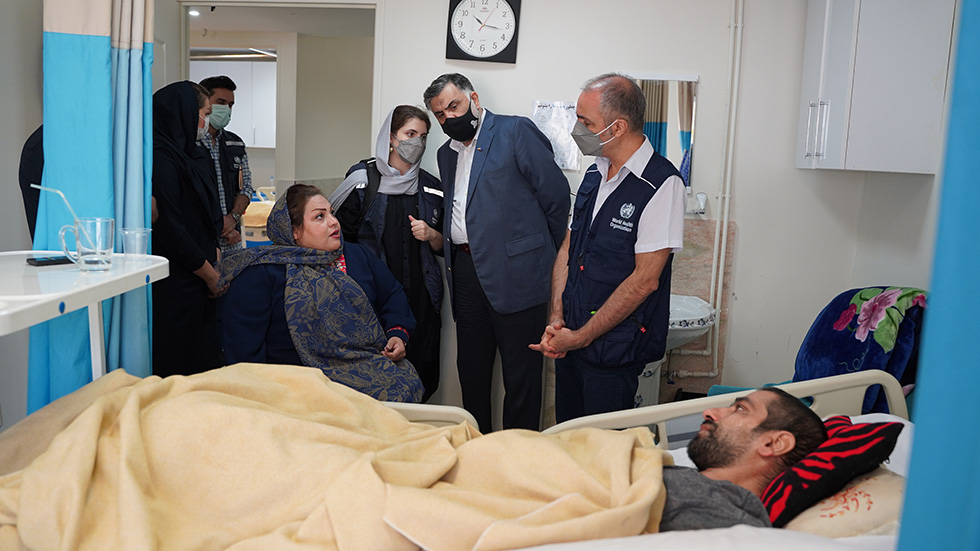 The temporary admission ward at the Association for the Protection of People Living with Spinal Cord Disabilities where people with recent disabilities can receive special care and education. Credit: WHO/Islamic Republic of Iran
The temporary admission ward at the Association for the Protection of People Living with Spinal Cord Disabilities where people with recent disabilities can receive special care and education. Credit: WHO/Islamic Republic of Iran
Tehran, 13 September 2022 – Dr Syed Jaffar Hussain, World Health Organization (WHO) Representative to the Islamic Republic of Iran, accompanied by a WHO team, visited a care centre affiliated with the Association for the Protection of People Living with Spinal Cord Disabilities to learn about the range of services offered by the Association and explore avenues for future partnership.
The Association for the Protection of People Living with Spinal Cord Disabilities was founded in 2006 by the late Dr Ali Zarrabi with the aim of promoting the health and well-being of people living with disabilities through a wide range of services and activities. The nongovernmental organization works closely with the State Welfare Organization, experts and service providers, and a community of volunteers, to foster a disability-friendly environment for a variety of service recipients from across the country.
Any person with spinal cord injuries and related physical disabilities can approach and register at one of the three main facilities of the organization in Tehran. Upon registration, a comprehensive health profile is developed based on a needs assessment and examination. Accordingly, the person is referred for a wide range of psychosocial support and counselling services, including high-quality rehabilitation services (physiotherapy, occupational therapy and speech therapy), nutrition counselling, hygiene support, recreational programmes, and, importantly, education on returning to the community. All of these services are provided in a disability-friendly environment, professionally designed and adapted to the needs of the target group.
The Association has been collaborating with WHO on a co-funded project to improve access to inclusive health care for older persons and people living with disabilities during the COVID-19 pandemic. The Association, together with two other nongovernmental organizations, is a member of the project’s steering committee—a multisectoral platform comprising government, professional associations and representatives from the target population. The steering committee is an effective platform for community engagement and data-driven decision-making. The involvement of these organizations has facilitated the identification of the most vulnerable people and contributed to data-sharing and coordination among partners.
“Even a small help makes a particular impact on the quality of life and well-being of people living with disabilities. The services of this Association are valuable contributions to the community and enrich partnerships, such as the ongoing project. We want to explore the expansion of such collaborations in the near future,” said Dr Hussain.
Beyond this co-funded project, it will be important to identify needs, explore the capacities of national and international networks, and dedicate resources to addressing the needs of the people living with disabilities, especially among more vulnerable groups such as disaster-stricken and refugee populations.
 The WHO team visiting an occupational therapy workshop at the Association for Protection of People Living with Spinal Cord Disabilities. Credit: WHO/Islamic Republic of Iran
The WHO team visiting an occupational therapy workshop at the Association for Protection of People Living with Spinal Cord Disabilities. Credit: WHO/Islamic Republic of Iran
People living with disabilities require an integrated approach whereby they can receive the necessary services and become empowered to participate in society and advocate for their health and well-being. The programmes offered by the Association are extremely valuable for re-socializing and reconnecting people living with disabilities with their families and communities and helping them to feel less socially excluded and isolated.








